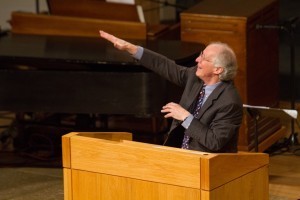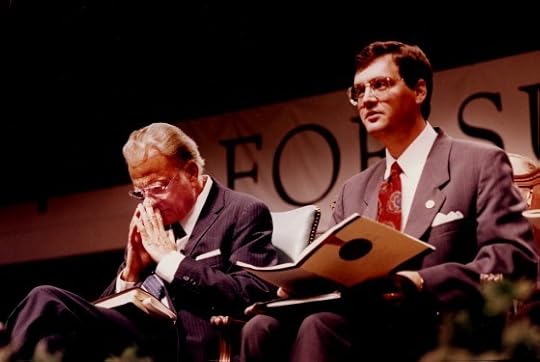Justin Taylor's Blog, page 165
March 29, 2013
John Piper’s Farewell Sermon
Shortly after 4:30 this afternoon, the residents of Phillips neighborhood in south Minneapolis—the most ethnically diverse neighborhood in the United States—may spot a familiar sight: a trim man in his upper sixties, bespectacled with thinning gray curly hair, leaving his two-story house to walk to church.
John Piper will make his way north across the bridge suspended above “Spaghetti Junction,” with its dull roar of freeway traffic, past the East Village Market grocery store, past Augustana Health Care Center for the elderly, past Andrew Residence for the mentally broken, and past the Elliott Twins apartments for low-income residents. And then he’ll arrive at a place he dearly loves, Bethlehem Baptist Church, where he has been preaching the glory of God in the gospel week in and week out for 33 years.
The walk takes seven minutes—six if he is running late, eight if he is especially enjoying the weather. He once counted his steps: exactly 600 paces from his front door to Bethlehem’s old main door. He has made this walk at least 10,000 times in the last 33 years—the equivalent of walking from the east coast to the west coast in the United States and back again. Six million steps.
It’s not the last time he will make this walk. But it is the last time he will do so as pastor of Bethlehem Baptist Church.
Tucked into the coat pocket of his charcoal suit jacket will be his compact ESV Bible, and in his worn leather briefcase will be a cheap folder, and in the folder will be a 11-page double-spaced typewritten sermon manuscript, with an array of handwritten circles and connecting lines and underlines and exclamation points and notes.
 Within a couple of hours the singing will cease, and he will rise from the front-row pew, place his sermon manuscript on the wooden pulpit, offer an introduction, and then read from Hebrews 13:20-21, the text for his Easter sermon that will double as his farewell sermon. (You can watch the live-stream tonight around 6:10 PM U.S. Central Time.) After he reads the benedictory text that begins, “Now may the God of peace who brought again our Lord Jesus, the great Shepherd of the sheep,” Piper will undoubtedly remind his beloved flock that the transition from one undershepherd to another is undergirded by a dying and rising Great Shepherd who is the same yesterday, today, and tomorrow.
Within a couple of hours the singing will cease, and he will rise from the front-row pew, place his sermon manuscript on the wooden pulpit, offer an introduction, and then read from Hebrews 13:20-21, the text for his Easter sermon that will double as his farewell sermon. (You can watch the live-stream tonight around 6:10 PM U.S. Central Time.) After he reads the benedictory text that begins, “Now may the God of peace who brought again our Lord Jesus, the great Shepherd of the sheep,” Piper will undoubtedly remind his beloved flock that the transition from one undershepherd to another is undergirded by a dying and rising Great Shepherd who is the same yesterday, today, and tomorrow.
Half a lifetime ago, at the age of 34, Piper preached his installation sermon, “The Wisdom of Men and the Power of God,” from 1 Corinthians 2:1-5. The date was July 13, 1980, and the location was in the old sanctuary of the adjacent building (now converted into office space and classrooms). The young shepherd—who had preached a total of about 15 sermons in his entire life—looked out at a sea of gray hair and spoke with candor:
I come to you as your pastor today with weaknesses (which you will learn soon enough) and in much fear and trembling.
Not that I distrust the power and promise of God but that I distrust myself.
Not so much that I will fail—as the world counts failure—but that I might succeed in my own strength and wisdom and so fail as God counts failure.
But Piper has succeeded, in the biblical sense, as God has been glorified in his desperate and dependent servant.
Piper did not begin this pastoral ministry unaware of the challenges and the pain and the heartache and the struggles that lay ahead. His father, a lifelong evangelist, had written him a candid letter the year before, reeling off a litany of inevitable pressures and discouragements that come with being a pastor. He noted: “At times you will feel the weight of the world on your shoulders. Many pastors have broken under the strain.” But then he reminded his son that “there will be a thousand compensations.”
You’ll see that people trust Christ as Savior and Lord.
You’ll see these grow in the knowledge of Christ and his Word.
You’ll witness saints enabled by your preaching to face all manner of tests.
You’ll see God at work in human lives, and there is no joy comparable to this.
Just ask yourself, son, if you are prepared not only to preach and teach, but also to weep over men’s souls, to care for the sick and dying, and to bear the burdens carried today by the saints of God.
His father’s words proved to be prophetic. God has been greatly glorified as a people have sat week in and week out, year after year, not only under John Piper’s preaching but also his pastoral care.
When all is said and done, John Piper will be remembered for many things. But apart from his own relationship to God and his relationship to family, his most important vocation will remain serving as a faithful, worshipful, prayerful shepherd to a local body of believers.
We are witnessing the end of a remarkable pastoral ministry—but not the end of his Christian service and ministry. My prayer, and eager expectation, is that the Lord will continue to use John Piper and to keep him faithful in this next season of life as he finishes strong for the glory of God in Christ Jesus.
Thank you, God, for this gift.
Jesus Paid It All
March 27, 2013
Not Your Mother’s Bible Study Guides
I’m excited about Crossway’s new 12-week Bible study guides—for groups, classes, or individuals—called Knowing the Bible. It tries to bring together gospel-centered biblical theological, sound doctrine, and legitimate application in a faithful and accessible way, under the editorship of J. I. Packer.
In this video introduction Dr. Dane Ortlund, an editor for the series as well as a contributor, explains what makes it unique:
You can download a complete free copy of Dr. Ortlund’s guide to the book of Mark to get a feel for the series.
Each book contains the following:
Reflection Questions designed to help you engage the text at a deeper level
Gospel Glimpses highlighting the gospel of grace throughout the book
Whole-Bible Connections showing how a passage connects to the Bible’s overarching story of redemption culminating in Christ
Theological Soundings identifying how historic orthodox doctrines are taught or reinforced throughout Scripture
Bryan Chapell says:
This Knowing the Bible series is a tremendous resource for those wanting to study and teach the Bible with an understanding of how the gospel is woven throughout Scripture. Here are gospel-minded pastors and scholars doing gospel business from all the scriptures—this is a biblical and theological feast preparing God’s people to apply the entire Bible to all of life with heart and mind wholly committed to Christ’s priorities.”
Graeme Goldsworthy writes:
These Knowing the Bible volumes introduce a significant and very welcome variation on the general run of inductive Bible studies. Such series often provide questions with little guidance, leaving students to their own devices. They thus tend to overlook the role of teaching in the church. By contrast, Knowing the Bible avoids the problem by providing substantial instruction with the questions. Knowing the Bible then goes even further by showing how any given passage connects with the gospel, the whole Bible, and Christian theology. I heartily endorse this orientation of individual books to the whole Bible and the gospel, and I applaud the demonstration that sound theology was not something invented later by Christians, but is right there in the pages of Scripture.
Volumes available thus far are: Mitchell Kim on Genesis, Drew Hunter on Isaiah, Justin Buzzard on John, Greg Gilbert on James, and Jared Wilson on Romans.
You can read sample chapters from each here.
Another round will be available in June/July 2014, with Kathleen Nielson on Ruth and Esther, Doug O’Donnell on Psalms, Lydia Brownback on Proverbs, Drew Hunter on Matthew, Justin Holcomb on Acts, and Ryan Kelly on Philippians. Eventually the whole canon will be covered.
Songs for the Book of Luke
One of the reasons I’m looking forward to the Gospel Coalition National Conference is that it won’t be just a conference on how to read and interpret and apply the Word, but we will sit under actual expositions of one of the Gospels.
I also love the idea behind the new album for the conference, “Songs for the Book of Luke,” which you can currently stream online for free. The songs will be played at a Tuesday night concert at the conference. And at this page you can get the chord charts, lead sheets, and simplified demos of each song.
Here’s a little preview of the project:
An Interview with Gordon Wenham on the Role of the Psalms in the Life of the Church
Ligon Duncan once wrote that the problem in the church is not “exclusive psalmody” (though he himself doesn’t hold to the view that we should only sing psalms in our congregational praise), but the problem is that not enough of us are practicing “inclusive psalmody (rediscovering and including the psalms, along with Scripturally sound hymns, in evangelical Christian public worship).
Crossway has just published The Psalter Reclaimed: Praying and Praising with the Psalms by acclaimed Old Testament scholar Gordon Wenham. This book is a collection of lectures and essays by Dr. Wenham on interpreting and applying the Psalter as a divine hymnbook for worship and direction.
Tony Reinke recently did an audio interview with Dr. Wenham about the book, and you can listen to it here.
How to Avoid a Broken Heart
C. S. Lewis:
There is no safe investment.
To love at all is to be vulnerable.
Love anything, and your heart will certainly be wrung and possibly broken.
If you want to make sure of keeping it intact, you must give your heart to no one, not even to an animal.
Wrap it carefully round with hobbies and little luxuries; avoid all entanglements; lock it up safe in the casket or coffin of your selfishness.
But in that casket—safe, dark, motionless, airless—it will change.
It will not be broken; it will become unbreakable, impenetrable, irredeemable.
The alternative to tragedy, or at least to the risk of tragedy, is damnation.
The only place outside of Heaven where you can be perfectly safe from all the dangers and perturbations of love is Hell.
—C. S. Lewis, The Four Loves (New York: Harcourt, Brace, Jovanovich, 1960), 169-170
March 26, 2013
Shellfish, Homosexuality, and the Charge of Christian Inconsistency
I find it frustrating when I read or hear columnists, pundits, or journalists dismiss Christians as inconsistent because “they pick and choose which of the rules in the Bible to obey.” What I hear most often is “Christians ignore lots of Old Testament texts—about not eating raw meat or pork or shellfish, not executing people for breaking the Sabbath, not wearing garments woven with two kinds of material and so on. Then they condemn homosexuality. Aren’t you just picking and choosing what they want to believe from the Bible?”
It is not that I expect everyone to have the capability of understanding that the whole Bible is about Jesus and God’s plan to redeem his people, but I vainly hope that one day someone will access their common sense (or at least talk to an informed theological advisor) before leveling the charge of inconsistency.
Read the whole thing.
20 Years Ago Today: Mohler Elected as President of Southern Seminary
Twenty years ago today—March 26, 1993-R. Albert Mohler Jr. (age 33) was elected president of the Southern Baptist Theological Seminary, the flagship school of the Southern Baptist Convention.
Younger readers may not realize this represented and resulted in an unprecedented transformation of a school from deep theological liberalism to a bastion of orthodox fidelity. George Marsden says the institutional shift is unprecedented in denominational history.
To hear the vision expressed as it was happening, you can read Dr. Mohler’s inaugural convocation address, “Don’t Just Do Something: Stand There | Southern Seminary and the Abstract of Principles.”
You can hear Dr. Mohler tell a portion of the story here in his own words (about 15 minutes, record in the year 2000). You can also listen to these two talks from Dr. Mohler (recorded in 2003) where he goes into more detail and sets the story in its wider context.
For more historical details, see Nathan Finn’s annotated bibliography of the conservative resurgence and Greg Wills’ Southern Baptist Theological Seminary, 1859-2009 (Oxford University Press, 2009).
Powlison on Whether Sanctification Is Only by Remembering Justification
There are few people whose writing on sanctification I find more valuable and insightful than David Powlison’s. His latest essay for The Journal of Biblical Counseling (27:1), “How Does Sanctification Work? Part 1” is no exception.
Here’s the takeaway. I dare not extrapolate my exact experience of God’s mercies to everyone else. Similarly, those who have had their Christian life revolutionized by awakening to the significance of justification by faith dare not extrapolate that to everyone else. One pattern of Christ’s working (even a pattern common to many people) should not overshadow all the other patterns. A rightly “unbalanced” message is fresh, refreshing, joyous, full of song, life-transforming. But eventually, if it is oversold, it becomes a one-string harp, played by one finger, sounding one note. It drones. Scripture and the Holy Spirit play a 47-string concert harp, using all ten fingers, and sounding all the notes of human experience. Wise ministry, like growth in wisdom, means learning to play on all the strings, not harping on one note.
I am certain that those who teach “sanctification by revisiting justification” have heard that message as a new and joyous song that sanctifies them. May Jesus Christ be praised! Perhaps God has been liberating them from a ponderous Christianity that seemed to breed a weight of failure to perform, of failure to live up to expectations, of failure to accomplish all that needs doing, and of judgmentalism toward others who fail. May the God of mercies be praised! But let’s not forget to learn all the other sweet and joyous songs. And let’s learn the darker notes of lamentation and the blues. Let’s learn the call to action in work songs and marching music. And let’s learn everything else that comports with and nourishes life in Christ.
In an article planned for the next issue of the journal, Powlison plans to look at several related questions:
Is sanctification essentially the activity of remembering and rebelieving that Jesus died for your sins?
Is self-justification by your own performance the chief problem that sanctification must deal with?
When the Bible says to “make every effort,” is the hard work chiefly the struggle to remember and believe again that we are saved by the achievement of our Savior?
“In each case,” he writes, “I will say No, and will seek to widen both our personal approach to sanctification and the scope of ministry to others.”
You can read another excerpt from the first essay here or purchase it here.
Articles from the latest issue now cost $1.50 each (or you can get the current issue for $5, or three full issues a year for only $10). But they also provide free author bundles from their archives. So you can download nice PDF sets of articles by Paul Tripp, Tim Keller, and John Piper.
Learning from a 96-Year-Old Theologian
 David Mathis and Tony Reinke recently made the trek to a small town in Minnesota to interview the author of a big systematic theology book whose fascinating life history seems unknown to almost everyone.
David Mathis and Tony Reinke recently made the trek to a small town in Minnesota to interview the author of a big systematic theology book whose fascinating life history seems unknown to almost everyone.
An excerpt from their piece:
Robert Duncan Culver is the only surviving founding member of the Evangelical Theological Society — and his mind is sharp enough to recall his membership number was 158. He taught a combined 25 years at Wheaton College and Trinity Evangelical Divinity School, and stirred up his share of controversy.
“I don’t mind disagreeing,” says Culver. “I can live without everyone’s short-term friendship.”
He knew evangelical stalwarts like Kenneth Kantzer (1917-2002) and Carl Henry (1913-2003) and John Gerstner (1914-1996) — especially Kantzer (more on him later). And he still remembers the details, down to the exact dimensions of the house of worship he built with his own hands while planting a church in Ohio in the early 1940s.
He’s an eleventh generation American, of certifiably Puritan descent. One of his ancestors came to the New World in 1630 with John Winthrop (1587-1649), who founded the Massachusetts Bay Colony. And he’s a man who has known 37 years of marriage to each of two different women: Arlene (from 1937 until her death in 1974) and Celeste (from 1975 to the present).
Most notably, Culver is the author of the massive 1200-page theology published in 2005 by Christian Focus, Systematic Theology: Biblical & Historical, the book he moved to rural Minnesota to work on, and gave over a dozen years to writing.
Tony and I knew we were in for a treat, and Culver didn’t disappoint. It made for a seriously interesting lunch appointment and afternoon interview.
You can read the whole thing here.
A note to young theological journalists: let’s see more stories like this. It’s a way to learn from the past, establish unexpected friendship, honor our elders, and produce pieces worth reading.
Justin Taylor's Blog
- Justin Taylor's profile
- 44 followers





